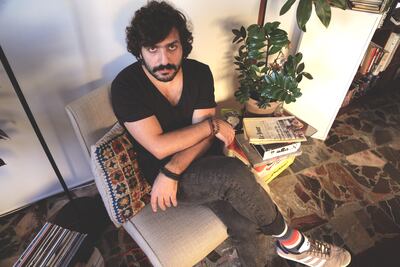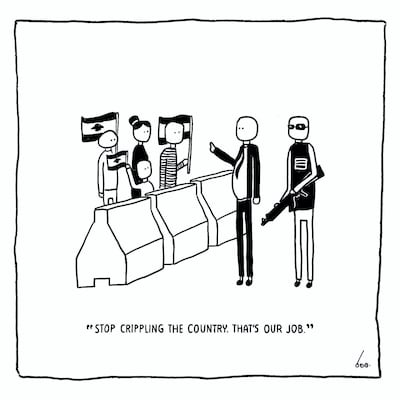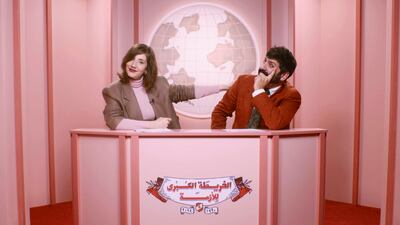Since 2018, satirist Bernard Hage has been observing the social and political woes of Lebanon, giving a voice to the mood of the country through art.
Best known for his The Art of Boo cartoon series, arising from "random jokes" about Lebanese daily life posted on social media, what began as frustrated self-amusement has subsequently surged in popularity thanks to a creative sense of humour that straddles the line between relatable, lighthearted comedy and biting criticism.
With his latest project, however, Hage is putting down his pen and stepping in front of the camera for The Great Map of the Crisis. Produced in collaboration with the Lebanese Association for History and humanitarian group forumZFD, this five-part satirical online series – part sketch show, part documentary – seeks to untangle the often confusing and contradictory historical context that has led to Lebanon's current state of unfolding crisis.
“For me, this project is a necessity,” Hage tells The National. “We have reached a point now where we have lost our position in the chaos. We need to stop and analyse what is going on. In Lebanon, we have a magnificent talent for overcoming crises and problems, mostly because we never discuss them. We cannot move on unless we discuss it and try to find solutions, other than just laughing.”

Despite swapping Lebanon for Berlin three years ago, Hage remains deeply tied to his troubled homeland. At the same time, he worries that many Lebanese have given up trying to understand the state of their struggling country. While the current Lebanese liquidity crisis began in 2019, the true extent of Lebanon’s problems is far more complex and multifaceted, extends far farther back and is mired in sectarian power struggles, backroom deals and corruption.
Even in his own work, Hage's cartoons are deliberately basic in style, stopping short of directly identifying the political figures and policies he has criticised in the past. "The root of the problem that drove us to come up with this project is that we don't know our own history,” he explains. "We decided to do what most Lebanese – including myself – avoid, by naming people and talking about events. This isn’t about being biased towards a certain narrative; it's simply about time to say the obvious.
“Unfortunately, most people will not look into these topics unless they are made more accessible. Their daily lives are already tiring and hectic enough, so I thought following a more sarcastic approach would encourage people to listen and make it easier to digest.”

Presented by Hage, alongside comedian Nadyn Chalhoub, co-creator of the web series, each episode of The Great Map of the Crisis deals with a different aspect of Lebanon’s present difficulties, all corresponding to their own area of Hage’s eponymous illustrated map. The satirical tone is immediately apparent and not subtle, with the map itself taking the shape of a pile of excrement.
The first episode, The Collapse, sets the scene by analysing the onset of the financial crash and Lebanon’s ongoing crisis. The second, The Golden Days, tackles the blinding effect of nostalgia and examines the developing issues before 2019, going back decades. Meanwhile, the third, The System, discusses the main economic and political players in Lebanon. The fourth, The Forest of the Civil War, focuses on the events of the Lebanese Civil War, the resulting amnesty law and the sectarian power-sharing deal that has persisted in Lebanese politics ever since. The fifth and final episode, The Present Past, reflects on the thoughts and feelings of contemporary Lebanese society.
While Hage’s decision to place himself in the spotlight is a departure from his usual approach, he seems to have taken it in stride, even if it wasn’t part of his original plan. “I started working on this project in 2020,” he explains. “When I started writing the scripts for the episodes, I had to think of who I would contact in order to play the role because I needed to write them in a way that fitted that person's humour. I felt much more comfortable writing something that I could easily say myself.
“It was a very long process, collaborating with the researchers in order to decide what topics we were going to discuss, and how we were going to present the timeline of events.
"It's what I've been circling around in most of my cartoons and writing, so it’s liberating to be able to express my feelings towards the politics, the history and what's happening on a daily basis here in Lebanon.”
Unfortunately, Lebanon’s situation continues to change and deteriorate, driven by both internal and external factors. In particular, the continuing war between Israel and Hamas in nearby Gaza has inflamed tensions between Israel and Lebanon, leading to escalating acts of aggression from both the Israel army and Hezbollah on the Lebanese border.
“Before October 7, we discussed the continuous possibility of war between Hezbollah and Israel, and how this is an excuse that Hezbollah uses to keep their weapons,” says Hage. “Throughout the whole project, we were having to update information continuously. After October 7, we gave up on reshooting everything again and just added a disclaimer.”
By addressing the issues of Lebanon’s broken political system head-on, even humorously, Hage hopes to get people to engage with the issues their country is facing, and begin to change the way they think about their situation.
“I would like people to push themselves into more critical thinking towards the whole Lebanese crisis and renegotiate their position towards Lebanon,” he says. “I don't want to be the teacher, lecturing the Lebanese people and telling them what to do. I don't think it's for me to say. But I would like for them to decide for themselves where they will go from here.”
The Great Map of the Crisis is available to watch on YouTube

